Hey guys, it's Scott.
It is Friday, February 3rd. I can't believe it, it's my oldest kid's birthday. Jack turns 16 today, so I'm sort of losing my mind.
But a tiny bit of housekeeping before I jump into today's post. So this coming Monday, February 6th, is the final day to order Clear #1. Again, it's a creator-owned book from me and Francis Manapul. It's a sci fi noir and it comes out from Dark Horse Comics. It imagines a future where everyone connects to the internet neurologically and can skin the world however they want, and so you want to look out and see unicorns and rainbows, that's the way the world looks. You want to look out and see a horror movie, that's how it looks. The superstructure stays the same, but the cosmetics are whatever you make them. So it's a murder mystery that takes place in this future and the detective, Sam Dunes, always keeps his setting unclear. We're really really proud of it. I hope you'll check it out has loads of extras. So yeah, Monday.
And then the following week is your last chance to pre-order Nocterra #12, the first issue in our third big arc. This arc is bigger and crazier than any we've done, I promise. It's called “No Breaks.” Tony Daniel returns on art and I can't wait for you guys to see it! Luckily, he and his family got great news about his daughter's health, everything is good, and we're ready to rock on that book. So I hope you'll order Clear #1 from Dark Horse this Monday and then Nocterra #12 from Image after that!
Okay, so I wanted to just touch base really quick about the announcements that were made about DC Studios. First, I was always a fan of Zack Snyder and he was very kind to me. We interacted over the years a couple times and I have nothing but nice things to say about him. But also James Gunn, too. I've always really loved James Gunn, and as a comic fan himself, he's interacted with a bunch of us, me included, over the years. He’s been incredibly supportive of stuff that we've done, both at Marvel and DC. So first, it's nice to have someone who's an actual dyed in the wool comic fan, as Zach was too, but one that’s fully taking over the reins. First, I'm impressed with James' vision because I love that it feels coherent. That’s not to say Zach's vision wasn’t coherent as well, none of this is a knock on him. What it's about is the excitement that I feel over having another singular and coherent vision for the whole universe.
Now I know can be controversial. Some people say you don't want a coherent vision, you want this fractured, open world where you can do all kinds of different things like The Batman at the same time that you're doing the Flash TV show, and I understand that argument 100%. But I want to make a counter-argument which is really built on my experience at DC Comics. For me, I started at a time when I think there was much more connectivity, or at least there had been up to the point that I started. The very first summit I ever went to at DC was in 2009. I was a baby, it was me and Jeff Lemire, and I was terrified. And I remember sitting in a room with all these great writers and artists that I admire, from Keith Giffen, Brian Azzarello, Geoff Johns, Gail Simone, everybody. It was this huge, long table and Dan DiDio and Jim Lee got up. This is pre-New 52, we didn't even know about the New 52, we didn’t even know about Flashpoint, I think this was where we actually got pitched Flashpoint. But they got up and they said “we have to reconnect to our values, what makes comics special.” And we talked about the fact that we have the biggest budgets and the most epic stories and all those things. But one of the things we kept coming back to was the interconnectivity.
And for me, growing up being able to lose myself in the world of DC Comics, the world of Marvel Comics—knowing that Green Lantern might show up in Batman, knowing that Punisher could show up in Wolverine, or that the X-Men might meet Spider-Man, and then having the stories connect around a single story trunk at one time, having them unite around an event like Secret Wars or Secret Invasion or Final Crisis or any of that kind of stuff. I love that aspect of it because to my mind, comics was the only place in town that could do that. I mean, culturally, there aren't the same huge, multifaceted, immersive universes. That was the joy of comics, that it was a rabbit hole you could fall down and find stories within one universe that were part of one comprehensive story that was being told and yet had plenty of room to breathe.
And that’s my argument, when there's a singular vision, and it doesn't have to be from one person. It can be from a collective, it can be from a whole bunch of creatives, but when there's a vision that everybody is behind that has a single ideology, that has a purpose, when there's a story that you're all telling that reaffirms the values of your company, of your characters, of all of these things, it allows then for creators to move away from that in pockets and do things that are varied and diverse. When you don't have that, it becomes chaotic, honestly. And so my experience at DC after that first meeting, I was so excited. I was like “we're all telling one big story!” And this was back when we got pitched Flashpoint and there was a feeling we were all going to wrap around that maypole that was Geoff’s storytelling with that. But on the other side of that, what happened was the New 52, which seemed like something that had a singular vision, because we were all rebooting, but then quickly proved itself to not have that vision at all, when it was more like, “well some books have rebooted, some books still have continuity going, some books are a mix…” And then we didn't have a main story as to why this was all happening or what was going to happen to reconnect us to the original universe in some way. And we tried to reverse engineer it, but it's all after the fact.
And so I think especially in today's economy, there's this kind of feeling that “you know what? When you're in a company where you don't know what's gonna happen and the boss is spontaneous, you never know! Maybe they'll pick your comic or give you a shot on the biggest book possible because who knows what will happen here? It's all open and fun and impulsive and who knows!” And I benefited from that system tremendously, but I didn't like it because it was intensely anxiety-provoking. I mean, I don't like the uncertainty of not knowing what's going to happen. I think most people working at a company hate it, and I think most readers, and fans don't like it either. But I think some kinds of administrators and bosses sometimes think that makes for a good environment. And ultimately, my belief isn't that that's always their intention. And I don't think people set out at DC to be like, “it's going to be chaotic and we're never going to know what's going to happen.” But it was because of a clash of personalities, and a lot of it was because of the fact that the company was bought and re-bought by multiple kinds of mega-companies above it, right? So when I started, it was co-opted or bought by Warner Brothers, and then Warner Brothers moved them out to LA, and then they got bought by AT&T and then Discovery Plus. And so internally, people aren't sure what their initiatives are. They're worried, “are we supposed to be about branding? Are we supposed to be disconnected? Are we supposed to support the movies and TV shows?”
And so there's a million reasons why the DC Universe, during the time I was there, was constantly reactionary, and that's the word I want to keep coming back to—reactionary versus being proactive. Reactionary is bad, in my opinion. Being reactionary, it might benefit you now and them, and it might be an environment where you can suddenly jump the line or do kind of crazy things. But it's also intensely uncertain and really nerve-wracking. And I don’t think it lends itself to positive creativity. Watching the Marvel universe being built cinematically from afar, watching those movies from Iron Man forward create the thing that comics is designed to create, this comprehensive, multi layered, interconnected web of story, was amazing. And it wasn't just ‘Kevin Feige had a vision.’ It was that Kevin Feige clearly understood the characters in the comics and allowed people to work within that one big meta-story they were building towards with Thanos and Infinity War and all of that, to create pockets of story that work for them. But everybody knew the plan, everybody knew the assignment. So in that way, I'd argue it's the opposite. When you're proactive and you create a tapestry of story that's leading somewhere over three, four, or five years, it allows people to feel comfortable and confident and to feel stable. And when you have that foundation under you, then you experiment and you do fun things. And you allow for little ebbings and worlds of story that go against the current and do things that are different.
But when you're like, over at the DC Universe, you have Zack Snyder's vision, which is a strong and a really particular kind of vision. But then you have a TV universe that goes in a completely different direction, and you're doing a push and pull between those. And then you have movies that come out that also set up different versions of the characters you're doing in the main movies, and you're jumping ahead, all of it just feels disjointed. And it feels like you have to pick your battles or pick your leader—which stories are real, which stories are not. And that to me lends itself to a lot of confusion and frustration both for creatives internally and for fans. The moment that I started to honestly worry about the DCU was when Batman v Superman was announced, not because I thought that was going to be a bad movie, but because it jumped ahead fast, right? It was going to be Batman in a Superman movie where Batman is seasoned and older. But we hadn't reestablished a new Batman yet, and it's not a bad idea to do, but the thing that worried me wasn't we were doing that movie next, but that there didn't seem to be any support to then do a young Batman somewhere in the next year or two, three, or four years that would fill in the gap. There didn't seem to be a plan to then introduce the Titans or introduce the Robins that he’d had in some way, if he's older, to start to fill in the cracks and to have, again, a comprehensive singular universe that you can explore in whatever direction you want but all makes sense in an open world.
So it's that stuff. And again with my experience at DC, I had wonderful experiences there. I'm so proud of my time there. Again, none of this is shitting on people over there. It's a matter of huge external pressures from companies that were buying and re-buying and changing initiatives with DC Comics over the years. And it's different visions of different personalities that were there and arguing with each other about it. But it was always you either picked a Dan vision or a Geoff vision and you had to kind of go one way or another as opposed to having one big, comprehensive vision. And you might like the comprehensive vision or you might not like it, like you might like Flashpoint or not when that was pitched to you. But you knew everybody was in, and once everybody's in, there was an opportunity to create stories within that world, and on the other side before we knew was the New 52, that would allow you to find your space because you understood that everyone had the same goal. That's the thing, a stable company, a stable story system, a stable sense of leadership and forward movement. And that's what I feel with this James Gunn plan. I love that they're doing odd things like The Authority and Swamp Thing.
I love that there's Gods and Monsters, and then the introduction of a new Superman, and then the introduction of Batman, and Batman is more seasoned but that's also because you can do a Batman origin story off that. You can have Elseworlds if you know what the world is. If you don't know what the world is, you can't. You can make a multiverse once you have your verse, like the Marvel Universe is so well established that then you can go out and do a multiverse. And I'm telling you, I've said it before, but I really believe that five or ten years from now, we're going to look back just in awe of what Marvel was able to do with that cinematic universe, like never in the history of man, or of modern culture of the last five hundred years or whatever has there been a project with so many stories from different groups of people attached to one meta-story that all work together in one story universe. I mean, they really beat comics at its own game during that period. I don't think that we as comic companies, Marvel or DC, were as successful or immersive or architecturally-minded as the cinematic universe was. It's even bigger than Star Wars! I mean, there's more storytelling in that universe that connects, disconnects, all of it, but as part of one story tree than you can wrap your head around. And it's amazing.
And eventually what I'd argue is that what comics has the ability to do now is to be more nimble, because you set up those systems and then you can't really get out of them. You're a victim of your own success. So you'd have to reboot everything at Marvel to be able to go back and get that super high stakes version of Avengers again. You can still do X-Men, but you have to figure out a way of starting everything over, and now you have rides connected to it and you have whole theme parks connected to the characters as you've established them, so it's hard. With comics you can pivot. You could do something right now in comics at Marvel or DC that doesn't reboot, but creates a meta-story or a big story that allows you to say, “we're bringing the biggest characters together in a way that you can't do again in TV and movies.” And I think there's an incredible opportunity for it, which is what I'm most interested in talking to DC about when figuring that stuff out if there's any real appetite for it, I don't know.
Now I'm just going on and on in a realm I shouldn't even be talking about, but that's my feeling. I'm really excited by the James Gunn slate. I think it shows that there's a singular but generous and comprehensive vision with a lot of room for versatility of story. At the same time I think having that plan and having a goal and having a ideology and a philosophy of storytelling, and a story that you are telling from beginning to finish, is the key. That's the thing that was missing from so many years of my time at DC, both in comics and, I think, in TV and film. And again, this is by no fault of Zack Snyder, it’s by a fault of the fact that I don't think there was a way, internally, because of structural stuff, because of personalities, because of all of it, to create a system of story either around that or buttressing that that would make for the same immersive experience that was going on at Marvel at the same time. And then it became “which stories are you picking? Are you picking Zack Snyder’s stories? Are you picking these stories? Which story is the real DCU?” And that just leads to a mess, I think. So I'm very happy to see the plans for DC and I'm excited to be a part of it as a fan and whatever input I'm asked to give later. Anyway, thanks you guys so much!
S








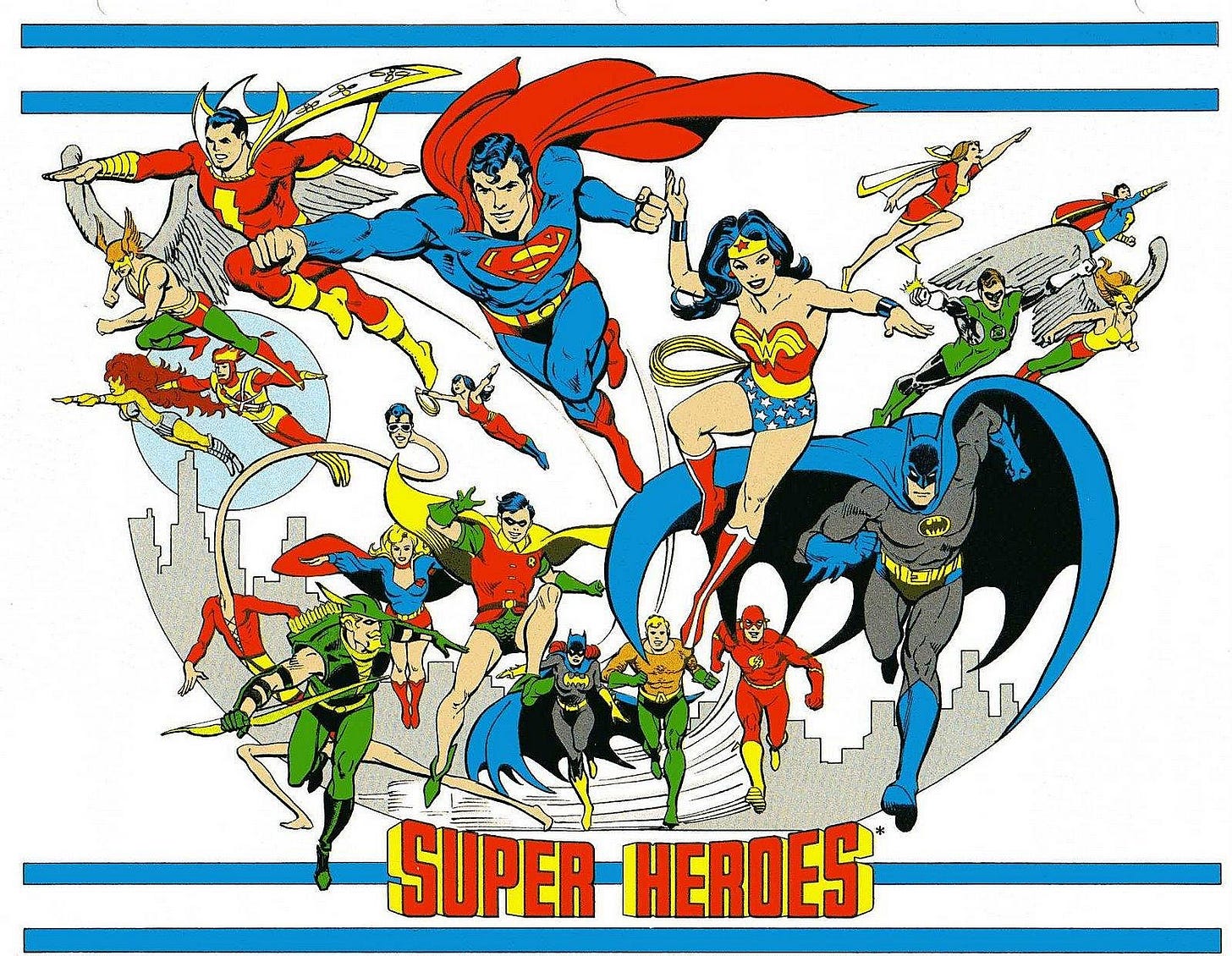
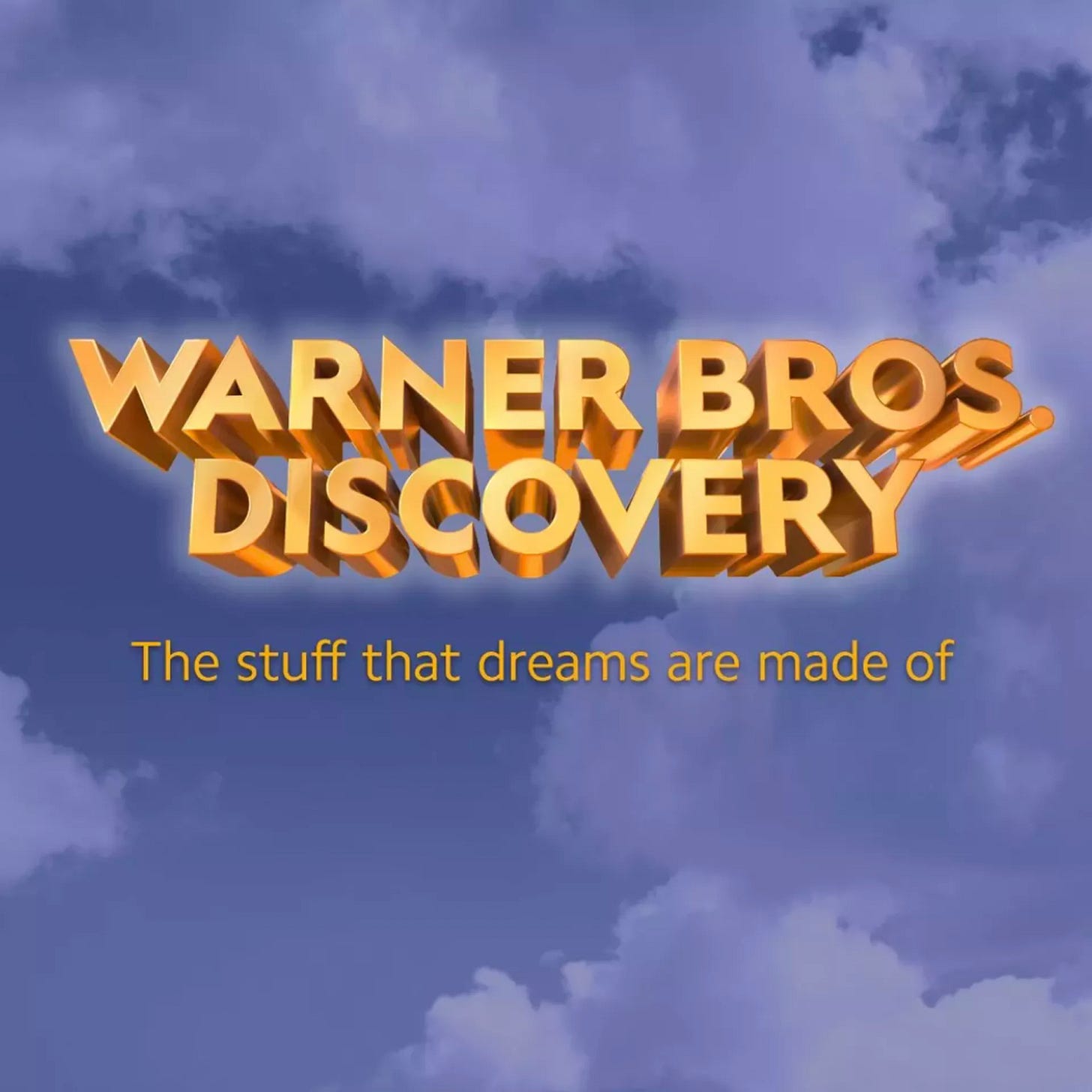
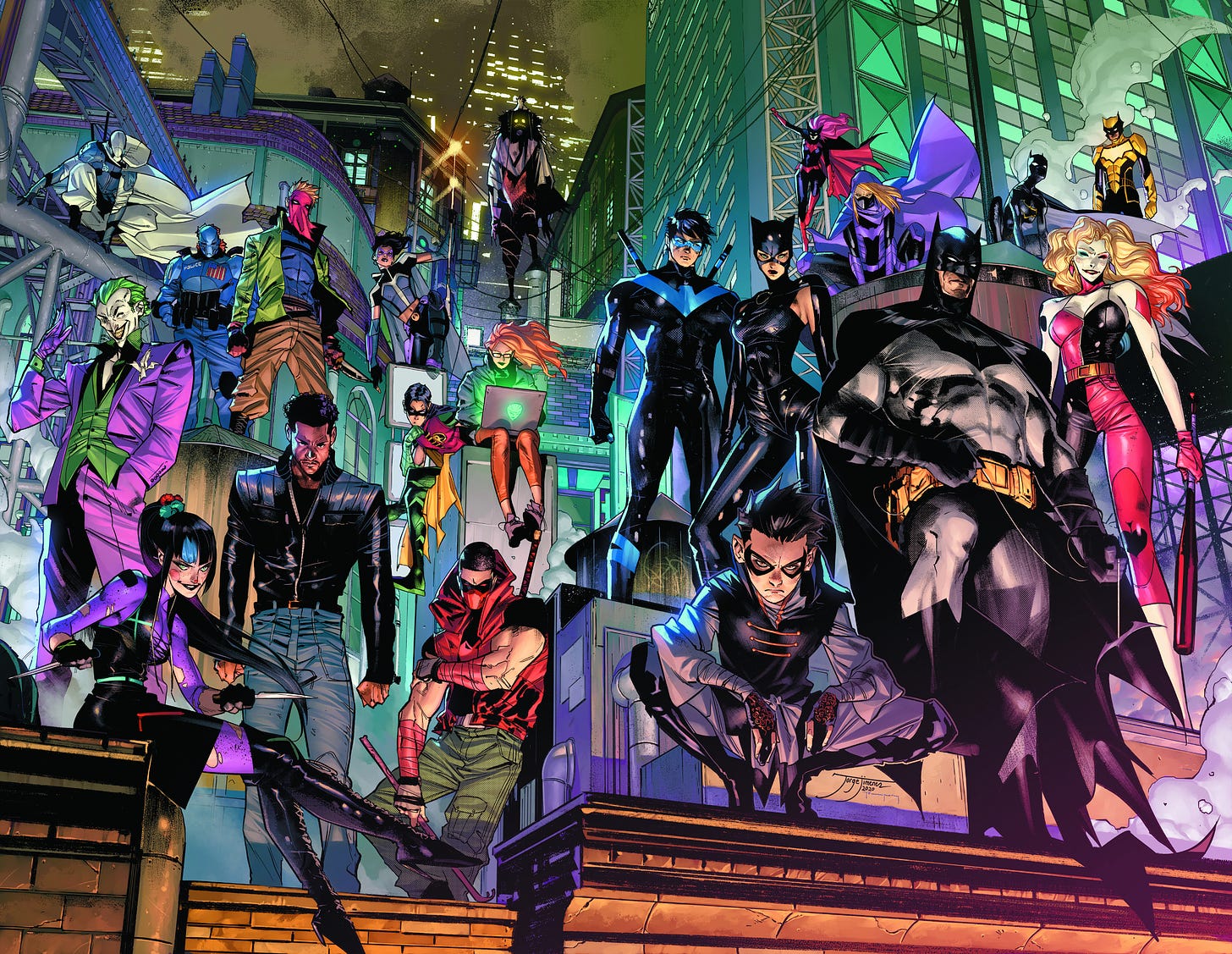




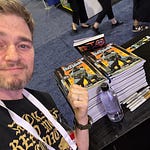
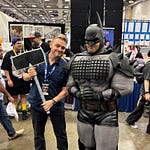


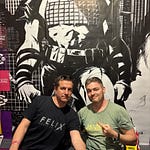
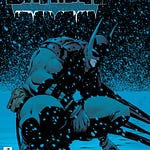
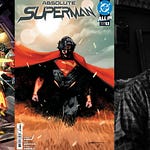
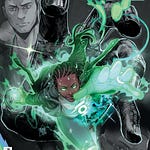
Share this post